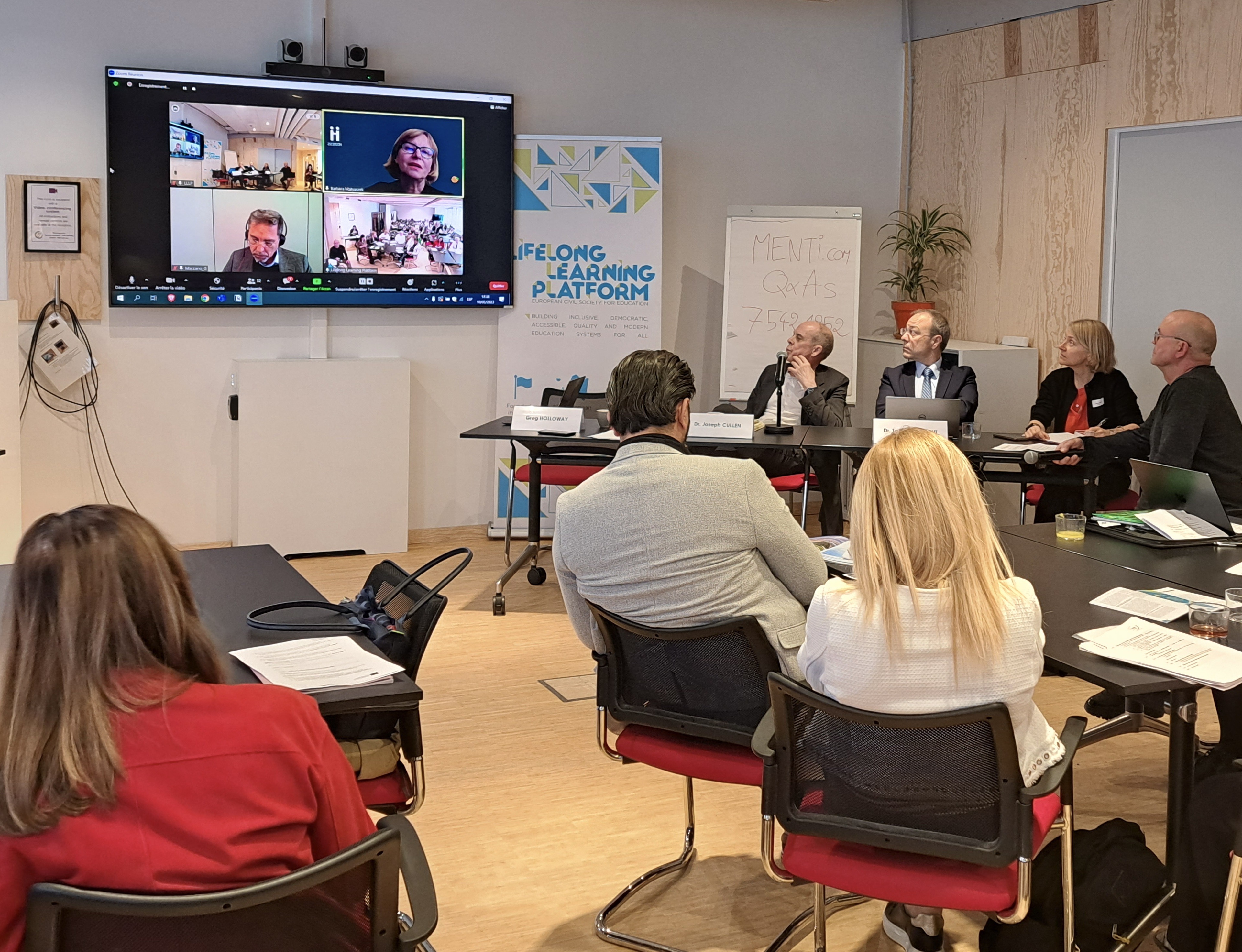
COMORELP’s final conference, organised by the Lifelong Learning Platform, took place on May 10 2023 and brought together over 100 participants from across Europe joining us online and in person in Brussels. The conference highlighted the challenges to and needs of, involving regional and local stakeholders in design, monitoring, implementation, and evaluation of lifelong learning (LLL) policies, all the while offering insight into the EU’s initiatives towards regional cooperation in national and European LLL policies.
How are European regions working together? How is the European Union working with regions?
In the first panel discussion, the main obstacles to regional cooperation were mentioned such as: little communication and cooperation among regions; difficulties finding a common thread and point of interest among regions as well as inadequate funding. To tackle regional obstacles to cooperation, Dr. Pat Carrington (HOLEX) suggested that regional LLL policies should broaden their scope to include policies for learners of all ages, hence for early childhood; childhood; youth; adults and seniors too. In addition, Pere Rotxés Peláez (SOC) raised the issue of language barriers. Given inter and intra-regional language barriers, not only do regions need to collaborate more among one another – they also need to find alternative and innovative communication pathways.
All panellists agreed that for effective interregional cooperation on LLL policies to happen, more funding and a centralised repository through which regions can communicate, are needed. Finally, Tina Mavrič (EAEA) argued that the digital world deletes physical borders and provides unprecedented opportunities for cross-regional learning. Therefore, online resources could be an innovative means for interregional cooperation. The discussion closed with a remark on the green and the digital skills: two potential topics for regions to tackle collaboratively. Comparing and contrasting which regions are better off in digital and green skills and practices can, in fact, be a topic on which to invest more, as it benefits all regions unanimously.
The COMORELP conference portrayed some of the instruments the EU put in place for regional cooperation. Pauline Boivin (LLLP) highlighted some of them including: the EU’s Smart Specialisation Platform; Cohesion Policy and Interreg Europe. Luc Schmerber Interreg Europe) presented the Interreg Policy Learning Platform focused on supporting innovative and sustainable solutions to regional development challenges. On the same note, Miguel Fernández Díez (DG EMPL) commented on the Pact for Skills, an initiative under the European Skills Agenda which opened up to the regional dimension with the aim to mobilise local and regional stakeholders to promote a culture of lifelong learning for all, build strong skill partnerships, monitor skill supply/demand and anticipate skill needs as well as work against discrimination and for gender equality and equal opportunities. A key point discussed throughout the conference was the need for regional LLL policies to look at individual needs, both at regional needs as well as individual learner’s needs. Indeed, regions know better what their own needs are. Hence, excluding regional authorities and stakeholders in designing and implementing LLL policies fails to create effective policies that tackle the specificities of regional cases in Europe as underlined by Dr. Gabriele Marzano (Regione Emilia-Romagna).
A new way of benchmarking? From competition to cooperation
The conference shed light on one of COMORELP’s initiatives as a project: the COMORELP benchmarking tool for inter regional comparison and learning. The tool was first introduced by some of the Comorelp project partners, namely, Claudio Dondi (CIS School for business management), and later presented more in depth by Magdalena Tarnowska-Torbus (Regional Labour office in Krakow) and Wojciech Kubica (Jagiellonian University).
The tool is a self-assessment questionnaire about the regional state of play of lifelong learning policies. The process will enable policy makers and stakeholders to build a comprehensive picture of the lifelong learning activities and policies in your region. In the COMORELP project the approach to benchmarking does not have a competitive sense: benchmarking primarily serves as an opportunity for mutual learning, sharing best practices, and inspiring one another through comparisons between regions.
What are the recommendations for policy makers and stakeholders at European and regional level?
Pauline Boivin (LLLP) elaborated on COMORELP’s policy recommendations. To ensure EU policies on LLL involve more regional stakeholders, Member States should have a say on such policies; innovation and regional policies should be more linked to skills and LLL policies; and regions should be more involved in the opportunities offered by such EU initiatives. As the COMORELP policy recommendations propose, regional authorities can be involved in peer reviews where their own policies are compared; regions can be involved in the European Year of Skills and national skills strategies; and inter-regional and regional policy labs on LLL policies can be organised.
Recommendations were also drawn from the three interactive workshops addressing three main questions:
- What is missing in lifelong learning policies at regional level?;
- How can we increase participation in lifelong learning?;
- What would make EU cooperation more attractive in your region?
Regarding the first question: LLL policies at regional levels do not have sufficient funding, time and human resources. In addition, the idea of lifelong learning itself has to be made more real, by involving all actors and stakeholders – from formal, non-formal and informal learning as well as across all ages – in LLL policies and initiatives. In terms of increasing participation in LLL, achieving this increase calls for a cultural shift from an economic-based thinking and approach, to a more learner-centred one; for more motivated and engaged key actors; funding; and accessible and visible lifelong learning opportunities. Lastly, COMORELP offered to the stakeholders involved in the past 30 months (in the Labs) the possibility for regions to share practices, and strengthen the monitoring system of LLL policies. However, to make EU cooperation more attractive regionally, there is a need to highlight the perks of cooperating in EU initiatives; celebrate regional, national, and European achievements; and find common values for regional cooperation.
